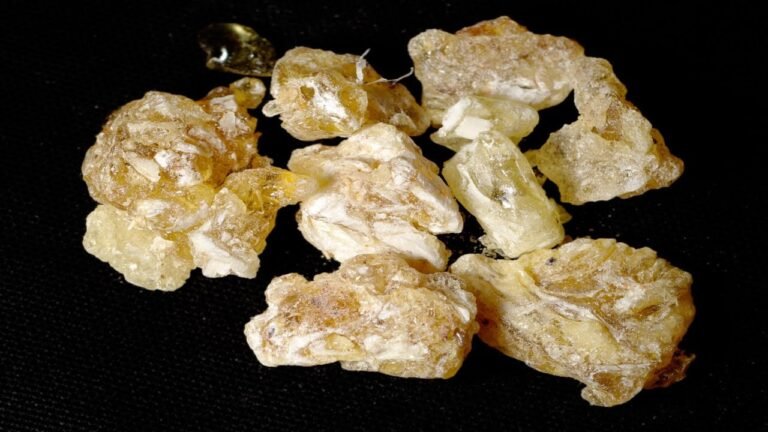The Significance of Frankincense: Unveiling Its Meaning
Frankincense, a resin derived from the Boswellia tree, has captivated cultures for centuries with its rich aroma and spiritual significance. Often associated with ancient rituals and healing practices, the meaning of frankincense transcends mere fragrance; it embodies a connection to the divine and a pathway to mindfulness. Today, this revered substance is experiencing a resurgence, as people seek its benefits for both physical wellness and mental clarity. Exploring the multifaceted meaning of frankincense reveals not only its historical importance but also its relevance in our modern world.
What does frankincense symbolize?
Frankincense has held profound significance in various cultures and religions throughout history. Its aromatic smoke, released when burned, has been associated with divine presence, making it a staple in sacred rituals. This ancient resin is often viewed as a bridge between the earthly and the spiritual, enhancing meditation and prayer, and inviting a sense of peace and contemplation.
In Christian tradition, frankincense symbolizes the reverence and honor due to Christ. It serves as a reminder of his divine nature and the sacrifices he made. The gift of frankincense by the Magi at Christ’s birth highlights its importance not only as a luxury item but also as a symbol of worship, reflecting the recognition of Jesus’ role in salvation.
Beyond its religious connotations, frankincense represents purity and righteousness. It embodies the idea of spiritual cleansing, helping individuals to transcend the mundane and connect with higher truths. As a result, frankincense continues to be cherished not just for its fragrance, but for its deep-rooted symbolism that resonates with the quest for spiritual enlightenment and moral integrity.
What does the Bible say about frankincense?
Frankincense holds a significant place in the biblical narrative, particularly within the context of ancient Israelite worship. This aromatic resin was not only used as an ingredient in the sacred perfume for the sanctuary, as detailed in Exodus 30:34, but it also accompanied the meat offerings during burnt and peace offerings, highlighted in Leviticus 2:1 and 16. Its fragrant smoke symbolized prayers rising to God, making it a vital element in the rituals of devotion.
The use of frankincense extended beyond mere ritualistic practices; it represented purity and holiness, enhancing the spiritual atmosphere of worship. As a valuable commodity, it was often associated with royalty and divinity, further elevating its status in religious ceremonies. Thus, frankincense served both practical and symbolic purposes, intertwining the physical act of offering with deeper spiritual meanings in the biblical tradition.
What are the uses of frankincense?
Frankincense, derived from the resin of the Boswellia serrata tree, has been revered for centuries for its medicinal properties. Traditionally known as Olibanum, this ancient remedy has been employed to address a variety of health concerns, including ulcers, dysentery, and asthma. Its anti-inflammatory effects make it particularly valuable in treating chronic conditions such as osteoarthritis and inflammatory bowel diseases, while also showing promise in managing diabetes and other ailments. This versatile resin continues to be celebrated for its potential to support overall well-being.
Discovering the Ancient Wisdom of Frankincense
Frankincense, a resin derived from the Boswellia tree, has been revered for centuries for its remarkable properties and spiritual significance. Originating from the arid landscapes of the Arabian Peninsula and parts of Africa, this ancient substance has played a vital role in religious rituals, traditional medicine, and even modern wellness practices. Its rich history is intertwined with the cultures of the world, from the sacred incense of temples to the healing balms of herbalists, making it a treasure trove of ancient wisdom waiting to be rediscovered.
The therapeutic benefits of frankincense are well-documented, with studies highlighting its anti-inflammatory, antioxidant, and antimicrobial properties. Used in aromatherapy, frankincense essential oil promotes relaxation and emotional balance, making it a popular choice for those seeking mental clarity and spiritual enlightenment. Additionally, its incorporation into skincare routines has gained traction, as it is believed to rejuvenate skin and reduce signs of aging. This versatility makes frankincense a valuable asset in both holistic health and personal care.
As we delve deeper into the wisdom of frankincense, we uncover not only its physical benefits but also its profound impact on our spiritual and emotional well-being. The ancient practice of burning frankincense during meditation or prayer serves to elevate the mind and spirit, fostering a sense of connection to something greater. By embracing this timeless resin, we can enrich our lives with its powerful properties, drawing upon the knowledge of our ancestors to cultivate a harmonious balance between body, mind, and spirit.
Aromatic Treasures: The Cultural Impact of Frankincense
Frankincense, a resin derived from the Boswellia tree, has captivated cultures for millennia with its enchanting aroma and profound significance. Revered in ancient civilizations, it played a pivotal role in religious rituals and healing practices, symbolizing purity and divine connection. The rich, resinous scent has transcended borders, influencing everything from traditional medicine to modern aromatherapy, while also serving as a cornerstone in the production of incense and perfumes. As a testament to its enduring legacy, frankincense continues to inspire artistic expression and cultural traditions, weaving its way through the fabric of human history and reminding us of our shared connection to nature’s aromatic treasures.
Healing and Spirituality: The Dual Role of Frankincense
Frankincense, a treasured resin derived from the Boswellia tree, has been utilized for centuries in various cultures for its remarkable healing properties and spiritual significance. Revered in ancient practices, it is often burned as incense during rituals, creating an atmosphere conducive to meditation and reflection. The aromatic smoke is believed to purify the space, allowing individuals to connect more deeply with their inner selves and the divine, making it a staple in spiritual ceremonies across the globe.
In addition to its spiritual applications, frankincense is celebrated for its therapeutic benefits. Rich in boswellic acids, this resin has anti-inflammatory and analgesic properties, which contribute to its use in traditional medicine for alleviating various ailments, including arthritis and respiratory issues. Modern research continues to explore its potential in supporting immune function and enhancing emotional well-being, highlighting the resin’s multifaceted role in both physical and mental health.
The dual role of frankincense in healing and spirituality exemplifies the profound connection between body and soul. As individuals seek holistic approaches to wellness, the integration of frankincense into daily rituals fosters a sense of balance and harmony. By bridging the gap between ancient wisdom and contemporary practice, frankincense invites people to embrace a more mindful existence, encouraging them to nurture their physical health while cultivating a deeper spiritual connection.
Frankincense Through the Ages: A Journey of Significance
Frankincense, a resin derived from the Boswellia tree, has captivated humanity for millennia with its rich aroma and profound significance. Used in ancient rituals and sacred ceremonies, this precious substance was treasured not only for its fragrance but also for its therapeutic properties. Civilizations such as the Egyptians, Greeks, and Romans recognized its value, incorporating it into incense for worship and as a vital ingredient in embalming practices. The trade routes that flourished around frankincense, particularly along the Arabian Peninsula, underscore its role as a symbol of wealth and spirituality, linking distant cultures through shared reverence for this remarkable gift of nature.
As time progressed, the allure of frankincense endured, evolving into a cherished component of traditional medicine and modern wellness practices. Today, it is celebrated for its calming effects and is often utilized in aromatherapy to promote relaxation and mental clarity. Beyond its aromatic and therapeutic benefits, frankincense continues to inspire artistic expression and cultural rituals, maintaining its relevance in contemporary society. This enduring journey reflects not only the resilience of a timeless substance but also humanity’s ongoing quest for connection, healing, and enlightenment through the ages.
The profound significance of frankincense extends beyond its aromatic allure; it embodies a rich tapestry of history, spirituality, and healing. Revered across cultures for centuries, this ancient resin continues to captivate and inspire, reminding us of the deep connections between nature and the human experience. Embracing the essence of frankincense invites us to explore not only its fragrant notes but also its enduring legacy in our lives, encouraging a holistic approach to wellness and mindfulness.







